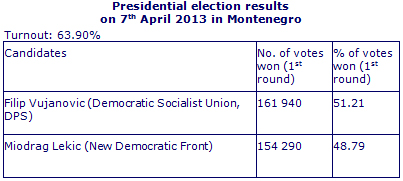Results
News
Corinne Deloy,
Helen Levy
-

Available versions :
EN

Corinne Deloy
Helen Levy
Outgoing Head of State Filip Vujanovic (Democratic Socialist Movement, DPS) was re-elected as President of Montenegro on 7th April. He won 51.21% of the vote against 48.79% which went to his only challenger, former Foreign Minister, Miodrag Lekic. Leader of the New Democratic Front, a coalition created last year on the occasion of the general elections held on 14th October 2012 which brings together New Serb Democracy (NSD) led by Andrija Mandic, the Movement for Change (GZP) led by Nebojsa Medojevic and the Pensioners' Handicapped and Social Justice Party, Miodrag Lekic was running however as an independent candidate. The election was an extremely close one with both candidates still claiming victory nearly 24 hours after the closure of the polling stations. Only 7000 votes (out of a total 327,000) separated the two candidates said Ivan Kalezic, head of the electoral commission.
Supported by the DPS, Filip Vujanovic did not however enjoy the support of the Social Democratic Party (SDP), a loyal ally of Prime Minister Milo Djukanovic's party (both parties have governed Montenegro together since 1998). The SDP was against what it deemed to be a third term in office for Filip Vujanovic as President of the country; the party's leader Ranko Krivokapic, the Montenegrin Head of State's eternal rival took legal action with the Constitutional Court over this issue.
Filip Vujanovic was elected on 11th May 2003 as president of Montenegro of the State of Serbia and Montenegro. Montenegro only regained independence on 3rd June 2006. Filip Vujanovic was then elected as President of independent Montenegro on 6th April 2008 in the 1st round with 51.89% of the vote. On 15th February last the Constitutional Court gave the green light to the outgoing Head of State to stand for a further mandate in the Presidential election. As a result of this the Social Democratic Party chose to boycott the election.
Montenegrin Fundamental Law (article 97) allows the Head of State, whose function is mainly honorary, to undertake two consecutive five year mandates. The DPS, which has led the country since the start of the 1990's, argued that the head of State's first mandate started before the independence of Montenegro and therefore this could not be taken into account.
Only two candidates were running for the Presidential election. Rade Bojovic, a member of the political club, Fair Montenegro, did not manage to present the 7,500 signatures necessary to run in the election.
Just over 2/3 of Montenegrins (63.90%) turned out to ballot i.e. -4.30 points in comparison with the presidential election on 6th April 2008.
 Source : Central electoral commission of Monténégro
Source : Central electoral commission of Monténégro
Political analyst Dubravka Uljarevic of the think tank Center for Civic Education attributes the longevity in office of the DPS to its unequivocal control over the civil service and the financial institutions. "It gives them a strength to which the opposition, a victim of its own weaknesses and a lack of international support, cannot respond," she declared.
"The president of Montenegro is not a major personality but the fact that he is elected by universal suffrage does increase his credibility however," declared political scientist Milos Besic. The editor in chief of the weekly Monitor, Drasko Djuranovic, has however said that Montenegro was entering a period of tension and crisis during which the opposition will challenge the legitimacy of the president as well as the coalition in office.
Aged 59, Filip Vujanovic is a graduate of the University of Belgrade. A qualified lawyer, he started his political career in 1993 and was appointed Justice Minister (1993-1995) then Home Minister (1995-1998) in the governments led by Milo Djukanovic. In 1997, when the DPS broke into two, one part led by a close ally of former Serb President Slobodan Milosevic, Momir Bulatovic, and the other led by Milo Djukanovic; Filip Vujanovic remained loyal to the latter. In 1998, he was appointed Prime Minister - a post he occupied until the general elections on 20th October 2002.
After the invalidation of two presidential elections in which he had easily taken the lead (invalidated due to lack of turnout: less than half of the registered electorate voted), Filip Vujanovic finally took the Presidency of Montenegro of the State of the Serbia and Montenegro on 11th May 2003. He became the first head of State of independent Montenegro on 6th April 2008, a post which he was re-elected to on 7th April.
Filip Vujanovic has promised to work towards the establishment of "a democratic, developed Montenegro where citizens will live better, which will be a good, reliable neighbour in the region and above all a State that will soon be part of the EU and NATO." He promised to work to "attract foreign investment, create jobs and increase citizens' salaries."
Prime Minister Milo Djukanovic announced that projects in support of the rule of Law and the fight to counter organised crime and corruption requested by the European Commission in order to open the chapters 23 and 24 of membership negotiations will be ready by the end of April. "We hope that negotiations on these two chapters will open in the second half of the year," he declared.
On the same theme
To go further
Elections in Europe
Corinne Deloy
—
25 February 2025
Elections in Europe
Corinne Deloy
—
18 February 2025
Elections in Europe
Corinne Deloy
—
28 January 2025
Elections in Europe
Corinne Deloy
—
14 January 2025

The Letter
Schuman
European news of the week
Unique in its genre, with its 200,000 subscribers and its editions in 6 languages (French, English, German, Spanish, Polish and Ukrainian), it has brought to you, for 15 years, a summary of European news, more needed now than ever
Versions :



